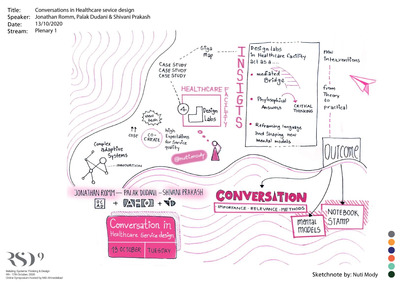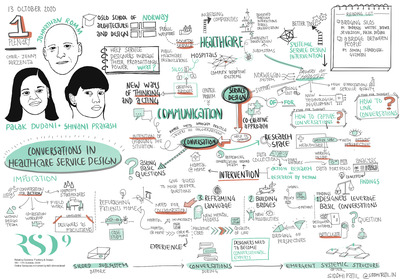Conversations in Healthcare Service Design – The characteristics and use of conversations in ecosystemic service design
Romm, Jonathan, Dudani, Palak and Prakash, Shivani (2020) Conversations in Healthcare Service Design – The characteristics and use of conversations in ecosystemic service design. In: Proceedings of Relating Systems Thinking and Design (RSD9) 2020 Symposium., 9-17 Oct 2020, Ahmedabad, India.
Preview |
Text
Romm_Conversation_RSD9_2020.pdf Available under License Creative Commons Attribution Non-commercial No Derivatives. Download (539kB) | Preview |
Preview |
Text
Romm_Slides_2020.pdf Available under License Creative Commons Attribution Non-commercial No Derivatives. Download (9MB) | Preview |
![Romm_Convo_2020.png [thumbnail of Romm_Convo_2020.png]](https://openresearch.ocadu.ca/3652/3.hassmallThumbnailVersion/Romm_Convo_2020.png)  Preview |
Image
Romm_Convo_2020.png Available under License Creative Commons Attribution Non-commercial No Derivatives. Download (2MB) | Preview |
![Romm_Convo2_2020.png [thumbnail of Romm_Convo2_2020.png]](https://openresearch.ocadu.ca/3652/4.hassmallThumbnailVersion/Romm_Convo2_2020.png)  Preview |
Image
Romm_Convo2_2020.png Available under License Creative Commons Attribution Non-commercial No Derivatives. Download (1MB) | Preview |
Abstract
This study examines the impact of conversations in public healthcare service design. We define what constitutes design conversations and the role they play in design processes for complex adaptive systems (CAS). Then, we explore the nature and use of conversations in two embedded design lab interventions in two hospital settings. In our summary of preliminary findings and contributions, we suggest future steps.
Healthcare organizations as complex adaptive systems
Public healthcare organizations, such as hospitals, are recognized as CAS. CAS are explained as living organisms, that includes a variety of dynamically linked independent subsystems with a capacity to learn and respond to circumstances (Begun, Zimmerman, & Dooley, 2003). Innovation inside CAS is often characterized as emergent, meaning that higher-order novelty is achieved through interactions and relationships between lower-order system parts or agents (Lichtenstein, 2014).
The need for conversations in systemic healthcare service design
Systemic service design is increasingly used as an approach to support the developments of more sustainable healthcare offerings (Barbero & Pallaro, 2017; Jones, 2013; Vink, 2019). Designing within service ecosystems focuses on resource integration beyond organizational boundaries. Facilitated, multiple stakeholder conversations are used to support interdependence, participation and emergence (Sangiorgi, Patricio, & Fisk, 2017; Jones, 2018), adding value in organizational processes and social discourse (Buchanan, 2001; Dubberly & Pangaro, 2015). All design activities are pragmatically guided by communications on intentions for changing a situation.
Hence, conversations for systemic design must seek to expose positions and contributions of various stakeholders (Jones, 2018). Literature on design for systems of cooperative work identifies four main purposes of conversations as for orientation, clarification, possibilities and action (Winograd, 1986). Jordan et al. (2009) define conversations in healthcare interventions, as “a collaborative process in which meaning and organization are jointly created” (p.2). Similarly, the early stages of service design processes are focused on learning and sensemaking while the latter stages center around cocreation of propositions (Stickdorn et al., 2018). Throughout these stages, a variety of issues are discussed with multiple stakeholders on various levels, highlighting needs, desires and perspectives.
Despite all conversations taking place in service design, little attention has been given to the nature and use of conversations in such processes. Hence, we set out to investigate the following: What are the characteristics of conversations during processes of healthcare service design and how are conversations used strategically by healthcare service designers?
| Item Type: | Conference/Workshop Item (Paper) |
|---|---|
| Divisions: | Faculty of Design |
| Date Deposited: | 06 May 2022 18:36 |
| Last Modified: | 06 May 2022 18:45 |
| URI: | https://openresearch.ocadu.ca/id/eprint/3652 |
Actions (login required)
 |
Edit View |

 Tools
Tools Tools
Tools